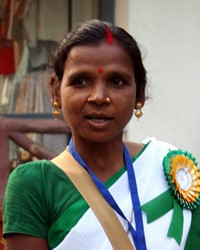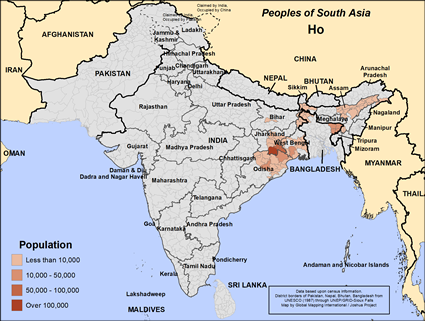Ho in India

Photo Source:
Ramesh Lalwani - Flickr
Creative Commons
|

Map Source:
People Group data: Omid. Map geography: UNESCO / GMI. Map Design: Joshua Project
|
| People Name: | Ho |
| Country: | India |
| 10/40 Window: | Yes |
| Population: | 1,086,000 |
| World Population: | 1,185,000 |
| Primary Language: | Ho |
| Primary Religion: | Unknown |
| Christian Adherents: | 2.38 % |
| Evangelicals: | 1.19 % |
| Scripture: | New Testament |
| Ministry Resources: | Yes |
| Jesus Film: | Yes |
| Audio Recordings: | Yes |
| People Cluster: | South Asia Tribal - other |
| Affinity Bloc: | South Asian Peoples |
| Progress Level: |
|
Introduction / History
The word "ho" means "human being." According to Ho belief, all other groups of people are considered to be foreigners or outsiders, and not men. This may explain their independent and sometimes isolationist nature. In the past, the British and Muslims have ruled the Ho tribe, but their fiercely independent nature has successfully kept them from the rule of the predominant Hindu community.
They live in remote parts of West Bengal, Odisha and Jharkhand. A smaller number live further east in Bangladesh.
What Are Their Lives Like?
About half are farmers, and one-third are landless farm workers. A small number work in iron ore mines that are encroaching on their homeland. They hunt in the wild forests. For that and other reasons, they need the forests to remain pristine.
Women have higher status among the Ho than they do in most tribes. There are five different kinds of Ho marriages, but the one involving kidnapping the bride is falling away. A high bride price payment has made many women wait till they are older to be married. It's common for a husband to be hen-pecked by his wife.
Dance is very important in Ho culture. Most Ho settlements have a dedicated dance ground that includes a cleared space with shade trees. They have their own kind of music involving drums and flutes.
What Are Their Beliefs?
The majority of the Ho have their own nature-based religion (Sarnaism) that doesn't fit in with Hinduism. They have their own gods and goddesses that they learn about and worship starting at a young age. They have a village priest called a deuri. They have a spirit doctor called a deowa who makes sacrifices to these spirits and gods. Much of this happens in a sacred grove outside the village. They also believe in witchcraft, and there is a designated older woman who uses evil powers to do harm to individuals.
What Are Their Needs?
The Ho people have a low rate of literacy and school attendance. In 2016 the government began a program to teach Hindi and mathematics to Ho children. They are trying to maintain the Ho language for younger children to reduce the number who drop out of school.
Prayer Points
Pray for the establishment of Christian schools among the Ho people.
Pray that the truth of the gospel will set them free and soften their hearts to Jesus Christ.
Pray for the gospel to reach the hearts of Ho families and village leaders.
Ask God to grant wisdom and favor to workers trying to reach the Ho for Christ.
Pray that God will protect and encourage the small number of Ho Christians.